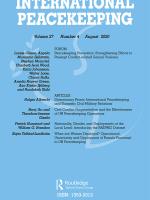Transitioning - a weak point in security and justice programming
This article in International Peacekeeping explores one of the weak aspects in security and justice programming: transitioning. It shows how transition can be seemingly small as well as comprehensive, but commonly have unpredictable, hidden and often unmanageable transformative effects on the trajectory of security and justice programs.
Transitions have received limited detailed analytical consideration in the literature on interventions because they are mundane and inevitable, and therefore taken for granted. However, individually and in combination, different types of transitions have instant as well as accumulative implications for the direction, emphasis and effects of programming.
Empirically, the article looks at three types of transition in Sierra Leone: (1) war to peace; (2) turnover of staff; and (3) elections leading to change of the party in power.
To conceptualize the logic of transitioning, ritual theory – and specifically liminality that is a central component of rites of passage – is used to capture the inherent diffuseness and unpredictability of transitioning. Transitions in programming are liminal moments, ‘neither here nor there’, and as such characterized by ambiguity and indeterminacy. The ambiguity and importance of transitions stem from their potency to disturb the direction of programming, requiring the suspension of routine, which internationally funded programming is notoriously ill-suited to deal with.
DIIS Eksperter

